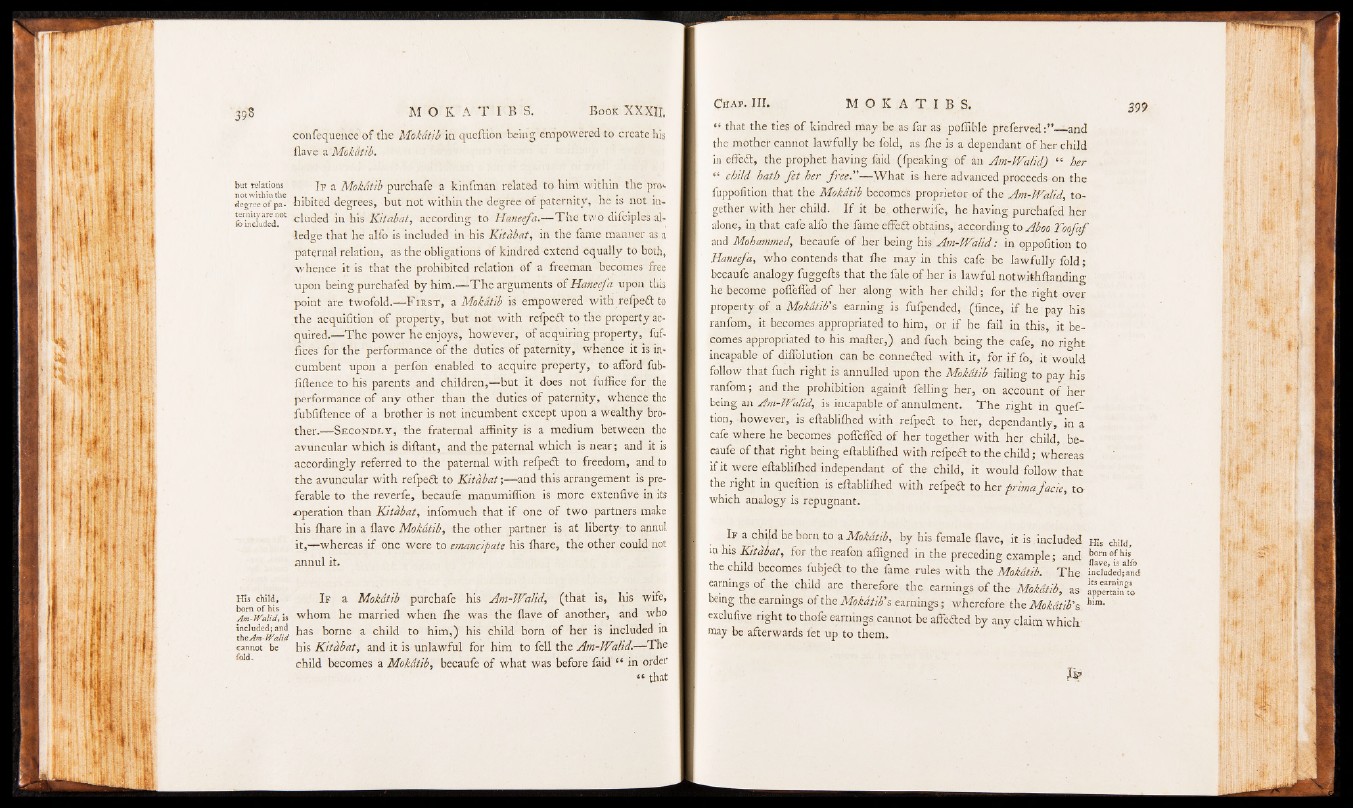
confequence of the Mok&tib iti queftion being empowered to create his
(lave a Mok&tib.
but relations Jp a Mok&tib purchafe a kinfman related to him within the pro-
degree of pa- hibited degrees, but not within the degree of paternity , he is not in-
fo^duded"01 c iL1ded in Kitabat, according to Haneefa.—The two difciples alledge
that he alfo is included in his Kitabat, in the fame manner as a
paternal relation, as the obligations of kindred extend equally to both,
whence it is that the prohibited relation of a freeman becomes free
upon being purchafed by him.—The arguments of Haneefa upon this
point are twofold.—F irst, a Mokatib is empowered with relpedl to
the acquifition of property, but not with refpedt to the property acquired.—
The power he enjoys, however, of acquiring property, fuf-
fices for the performance of the duties of paternity, whence it is incumbent
upon a perfdn enabled to acquire property, to afford fub-
fiftenee to his parents and children,—but it does not fuffice for the
performance of any other than the duties of paternity, whence the
lubfiftence of a brother is not incumbent except upon a wealthy brother.—
S e c o n d l y , the fraternal affinity is a medium between the
avuncular which is diftant, and the paternal which is near; and it is
accordingly referred to the paternal with refpect to freedom, and to
the avuncular with refpedt to Kitabat;—and this arrangement is preferable
to the reverfe, becaufe manumiffion is more extenfive in its
operation than Kitabat, infomuch that if one of two partners make
his ffiare in a {lave Mok&tib, the other partner is at liberty to annul
it,—whereas if one were to emancipate his {hare, the other could not
annul it.
His child. If a Mok&tib purchafe his Am-Walid, (that is, his wife,
^Am-Waiu, is whom he married when {he was the {lave of another, and who
inc]uded;and jlag porne a child to him,) his child born of her is included in
cannot be his Kitabat, and it is unlawful for him to fell the Am-Walid.— Ine
child becomes a Mok&tib, becaufe of what was before faid “ in order
“ that
“ that the ties of kindred may be as far as poffible preferved:”__and
the mother cannot lawfully be fold, as {he is a dependant of her child
in effedt, the prophet having faid (fpeaking of an Am-Walid) “ her
“ child hath fe t her fr e e ."—What is here advanced proceeds on the
fuppofition that the Mokatib become's proprietor of the Am-Walid together
with her child. If it be,, otherwife, he having purchafed her
alone, in that cafe alfo the fame effect obtains, according to AbooToofaf
and Mohammed, becaufe of her being his Am-Walid : in oppofition to
Haneefa, who contends that {he may in this cafe be lawfully fold ;
becaufe analogy fuggefts that the fale of her is lawful notwithftanding
he become poffeffed of her along with her child ; for the right over
property of a Mok&tib’s earning is fufpended, (fince, if he pay his
ranfom, it becomes appropriated to him, or if he fail in this it becomes
.appropriated to his mailer,} and fuch being the cafe, no right
incapable of diffolution can be connected with it, for if fo, it would
follow that fuch right is annulled upon the Mokâtib failing to pay his
ranfom ; and the prohibition againft felling her, on account of her
being an Am-Walid, is incapable of annulment. The right in question,
however, is eftablilhed with refpect to her, dependantly, in a
cafe where he becomes' poffeffed of her together with her child, becaufe
of that right being eftabliffied with refped to the child; whereas
if it were eftablifted independant of the child, it would follow that
the right in queflion is ellabliihed with relpcct to her prima facie, to
which analogy is repugnant.
If a child be born to a Mok&tib, by his female Have, it is included h;s chirj,
in his Kitabat, for the reafon affigned in the preceding example; and borno.fhis
the child becomes fubjedt to the fame rules with the Mokatib. The includedjand
earnings of the child are therefore the earnings of the Mok&tib, as
being the earnings of the Mokatib's earnings; wherefore the Mok&tib s. him-
exclufive right to thofe earnings cannot be affedted by any claim which
may be afterwards fet up to them.
Js>